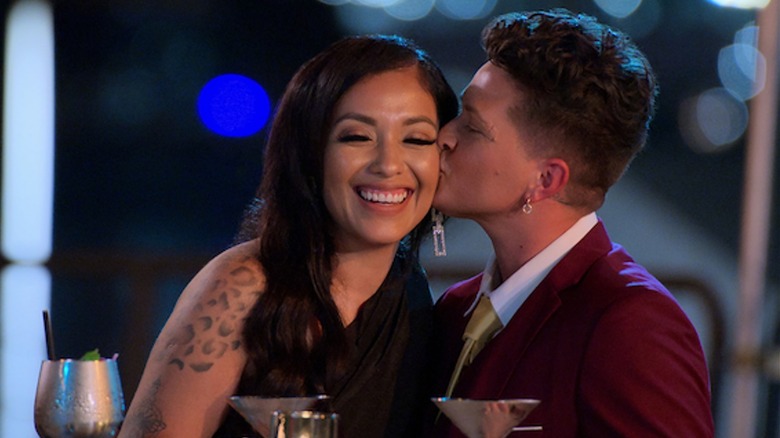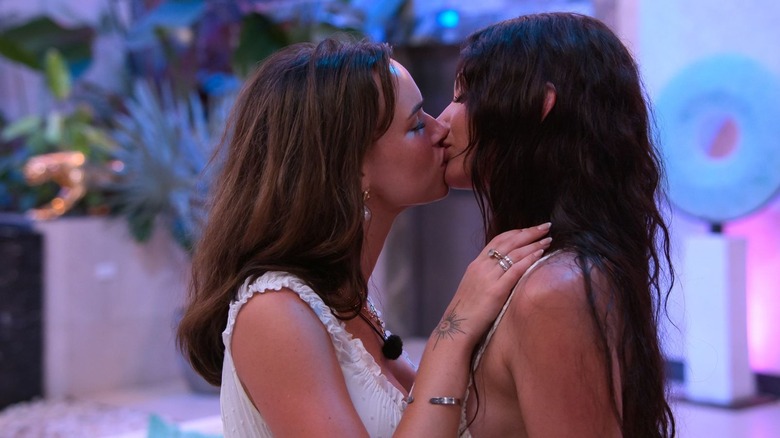The Ultimatum: Queer Love Is A Representation Win (Because LGBTQ+ Deserve To Get Messy Too)
Netflix's "The Ultimatum: Queer Love" is a major win for LGBTQ+ representation in mainstream media. There is an abysmal lack of reality dating shows that portray queer couples with real and relatable relationship issues. Most series either don't include any LGBTQ+ people at all or marginalize them to the point where they are more of a token than a feature on the show. "Queer Love" is different: It promises to show all the juicy drama audiences have come to expect from reality dating shows, but with lesbian and non-binary couples at the center, providing queer visibility for the underrepresented community, in all its messy glory.
A spin-off of "The Ultimatum: Marry or Move On," "Queer Love" follows five lesbian and non-binary couples as their relationships are put to the test. In each couple, one partner wants marriage while the other isn't ready to commit. During the social experiment, the couples are split and encouraged to date another participant, going through major relationship milestones like living together and meeting family. At the end of the experiment, each person must decide if they are ready to get married to their original significant other, or if they would rather move on and be single — or date someone new. Love triangles and jealousy are inevitable as couples split up and date other people in the group. For some, this provides an opportunity for them to step out of their comfort zones. Predictably, tears are shed and serious conversations are had about relationship issues many of us can relate to.
True LGBTQ+ representation is real and unfiltered
Contestant Tiff Der recently posted a TikTok video in which they discuss "normalizing queer relationships in reality TV," explaining that the show demonstrates how queer people thrive and can "be truly themselves." In other words, the show's authentic portrayal of relationship issues is a significant win for LGBTQ+ representation, particularly since queer people have been denied visibility for so long in reality TV.
There is plenty of can't-look-away drama in the new "Queer Love" season as couples discuss meeting each other's families, navigate what it means to be dating someone outside their race or ethnicity, and consider IVF as an option for having children. In addition to the very real and important issues that are brought up about race and meeting families, the show is rounded out with drama that some would say is more petty or lighthearted than serious. The participants in the series are as colorful and charismatic as you'd expect from any reality TV series — and watching them react (and over-reaction) to situations is half the fun. "Queer Love" defies the premise that only reality shows with straight, cisgender couples make good TV. It also shows that true representation doesn't mean a clean or watered-down version: It means showing the messy and drama-filled goodness we all love to watch.
We need more LGBTQ+ dating shows
"The Ultimatum: Queer Love" rebuffs the heteronormative ideals that we see in so many popular dating shows perpetuate. For instance, "Married at First Sight" (the U.S. version) has never allowed queer people to partake in the drama of marrying a stranger. At the same time, "Love Island" was criticized for being too heteronormative, to which producers (per The Guardian) responded by saying there are logistical difficulties to including LGBTQ+ people, due to the show's format of everyone having an equal chance at coupling up.
Netflix's "The Perfect Match" attempted to show queer love in Francesca Farago's ("Too Hot Too Handle") and Abbey Humphrey's ("Twentysomethings: Austin") romance, as well as Kariselle Snow's ("Sexy Beasts") sexuality, but these attempts were criticized for fetishizing bisexuality and being more of a "try" than an actual win, bringing to mind MTV's cringeworthy attempt to represent bisexuality in "A Shot at Love with Tila Tequila."
On the other hand, MTV's "Are You The One?" drew praise for its recent gender-fluid season that showed plenty of fights, love triangles, and alcohol-infused make-outs, as well as a broad spectrum of gender and sexual identities and relatable backstories (bullying, coming out, and family prejudices, etc.). As popular franchises, "Are You The One?" and "The Ultimatum" reach a large audience of viewers and finally put queer people in the mainstream reality show spotlight, normalizing and humanizing LGBTQ+ lifestyles. This is just the beginning: Given the political climate, and the continued attacks on the rights of LGBTQ+ people in America, we need more queer representation, now more than ever.
The first four episodes of "The Ultimatum: Queer Love" premiered on Netflix on Wednesday, May 24.

